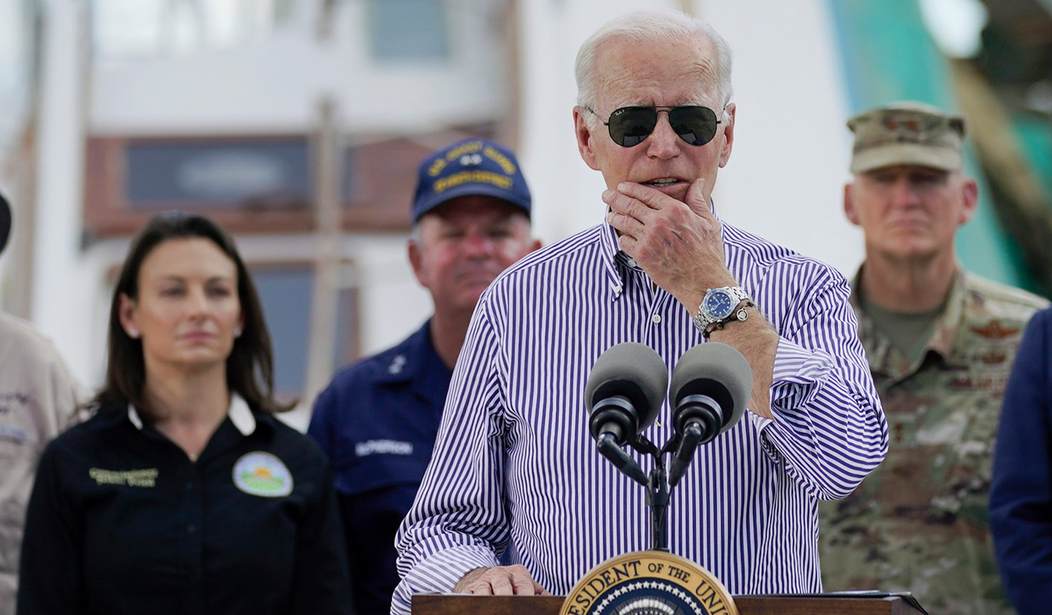Florida is still reeling from Hurricane Ian, which is officially the deadliest storm to hit the mainland US since Hurricane Katrina left some 1,800 people dead in 2005.
More than 1,00 lives have been lost from the storm, and though cleanup is underway, garbage and rotting fish still litter the streets of many Florida cities.
In the wake of the storm, President Joe Biden visited Fort Myers, Florida, where residents are rebuilding and police associations are collecting donations, including food, water, and generators for residents. In his official remarks delivered Wednesday, one of the first things the president did was blame the hurricane on climate change.
"I think the one thing [the hurricane] has ended is the discussion about whether or not there is climate change and we should do something about it,” Biden said.
This is not the first time Biden has blamed a hurricane on climate change as president.
Just last year, in the wake of the destruction wrought by Hurricane Ida, Biden traveled to the storm-ravaged areas of New Jersey and New York and delivered a similar message to the world: extreme weather poses an "existential threat" to humanity.
"The threat is here. It's not going to get any better. The question is can it get worse? We can stop it from getting worse," Biden said during a stop in Queens. "This is everybody's crisis."
Media did not fact-check Biden’s claims, perhaps because what he was saying has become conventional wisdom for many. Over the weekend, CNN’s Jake Tapper made a similar claim in an interview with Virginia Gov. Glenn Youngkin, noting that “scientists say [hurricanes] are more intense because of climate change.”
Recommended
The problem is, an abundance of data challenge Biden’s claims.
Hurricanes: What the Numbers Say
As many already know, 2022 was a historically low year for hurricane activity in the Atlantic prior to the arrival of Hurricane Ian.
“This is the first year since 2017 that a hurricane has not developed in the Atlantic by Aug. 1,” the Washington Post noted in August. (Oddly, the Post described this as a “lackluster” hurricane season.)
One mild summer of hurricane activity hardly makes a pattern, of course.
Fortunately, data from the American Meteorological Society show that fewer hurricanes have been making landfall on the continental US over the last century.
“[D]espite what you may have heard, Atlantic hurricanes are not becoming more frequent,” Danish economist Bjorn Lomborg pointed out in the Wall Street Journal, following Ida. “In fact, the frequency of hurricanes making landfall in the continental U.S. has declined slightly since 1900.”
Other independent analyses show similar findings.
“[A] new statistical analysis of historical records and satellite data suggests that there aren’t actually more Atlantic hurricanes now than there were roughly 150 years ago,” Science News reported in 2021, citing a study published in Nature.
More recently, a study published by the American Geophysical Union concluded that hurricane activity has “decreased significantly” since 1990, largely due to a “more La Niña-like base state.”
The authors of the study make it clear that it’s not just hurricane frequency decreasing, but intensity.
“We find that fewer hurricanes are occurring globally and that the tropics are producing less Accumulated Cyclone Energy—a metric accounting for hurricane frequency, intensity, and duration,” the researchers concluded in March.
None of this is to deny that hurricanes are serious business. They are. More than a hundred people are dead following a serious natural disaster. Millions of lives have been impacted and tens of billions of dollars will be spent to rebuild. But it’s important to remember that climate-related deaths are at historic lows, not highs.
For too long, politicians have used the threat of climate change as an excuse to play fast and loose with their rhetoric and the facts.
Joe Biden is entitled to his opinion on hurricanes and climate change, but as Daniel Patrick Moynihan once said, nobody is entitled to his own facts.

























Join the conversation as a VIP Member